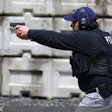More than 740 of the best police trainers gathered last week for the annual training conference of the International Law Enforcement Educators and Trainers Association (ILEETA) in Wheeling, Ill., for a week that was packed with training, lectures and interactive classes.
This year's conference brought representatives from Canada, Australia, Norway, and the United Kingdom. More than 150 vendors brought great new items to the ILEETA Expo for end users. I've attended every ILEETA conference since its inception and this one was the best for several notable reasons.
This year, there seemed to be many more first- or second-time attendees who brought a passion to learn from the best. Many were new trainers recently assigned as instructors, and they were seeking every opportunity to learn, share, and work out with the best. More and more are attending on on their own dime. Despite the tight economy, this was the best attended conference yet.
I had several occasions to introduce first timers to an author or renowned trainer whom they had read about. It's important to have a connection to your writers, trainers and industry leaders. Here the networking was great and new friendships were forged.
Here are some of my picks for the best seminars from the conference:
In "Terrorist Methodologies and Interdiction Tactics," Kevin Gors of Seal-Mar covered foreign and domestic actors and their operational loops. He laid out the actor's goals, operational doctrines, and counter-surveillance tactics. Historical and recent attacks were analyzed and Gors brought a newfound understanding to interdiction and prevention strategies. The class gave participants a better knowledge base for understanding global threats.
The conference offered certification courses in firearms, physical skills, defensive tactics (DT), and crime prevention such as the National Rifle Association's "Refuse to Be A Victim" course. Many trainers had opportunities to train with organizations that were far removed from their homes. A great example from the hills of Calgary, Alberta was the "Inside Position Combative" certification course by Tom Gillis. This physical and interactive course forced DT students to fight while in a subject's inside position. Striking and grappling drills with his techniques offered these weary students new alternatives to age-old problems of subject control.
There were leadership and management training tracks, including my own "Managing the Training Function." This course was designed for the newly assigned training unit commander or senior instructor in charge of training. A Job descriptions are rarely written for the training unit, and leadership training to direct this specialized unit can be even rarer. Far too often, agencies lump the training unit into other assigned duties. You may recognize that catch-all sentence from the last paragraph of the job description.
What was old was new is new again. With the growing numbers of outlaw motorcycle gangs (OMGs) and a public infatuation with them, there was a tactics course offered to explain their culture. Detective John Holiday of the DeKalb County (Ill.) Sheriff's Office gave students an in-depth view at OMGs in "Combating Outlaw Motorcycle Gangs: Tactics and Strategies to Win." Det. Holiday gave proven strategies to keep law enforcement officers safe when contacting and investigating these motorcycle clubs and their enterprises.
The resounding undercurrent throughout the entire conference was to keep officers safe, improve tactics, and keep communities safe. There is an epidemic of diminishing numbers of cops. Be it through layoffs or budgetary cutbacks, the good guys seem to be playing catch up with the ever increasing criminality and other such enterprises.
In his class, Tony Blauer said he believed this is creating "opportunity gaps" between crime and cops. Because of these prevailing times, he challenged instructors to "not think outside the box, I need guys that do not believe that a box exists." Statements like this drove the learning deeper and made students work harder to learn during the sessions.
I'd encourage you to attend the 2013 ILEETA training conference. Leave your ego at the house, and show up willing to learn, work, and sweat. We as instructors will make it safer and more efficient for our officers and deputies. See you next year.

















